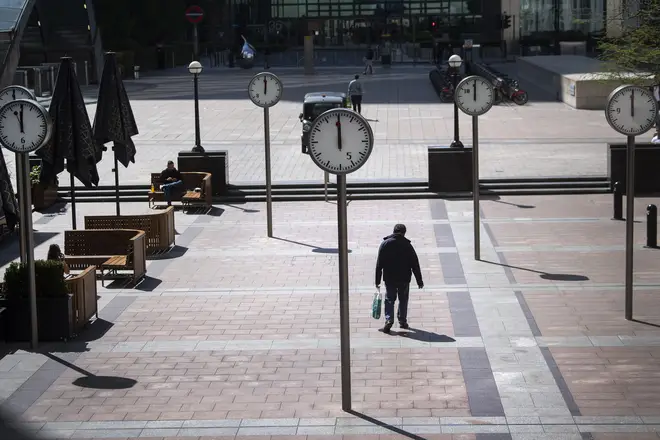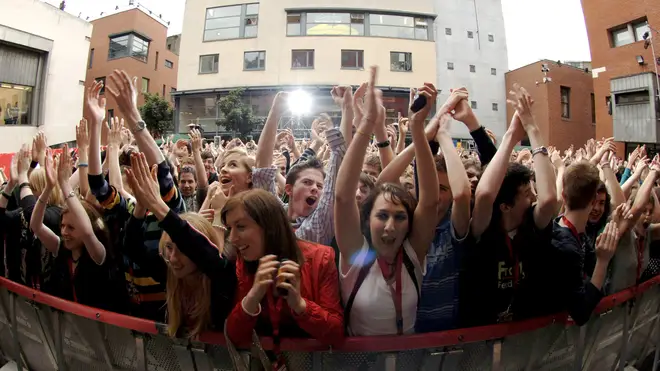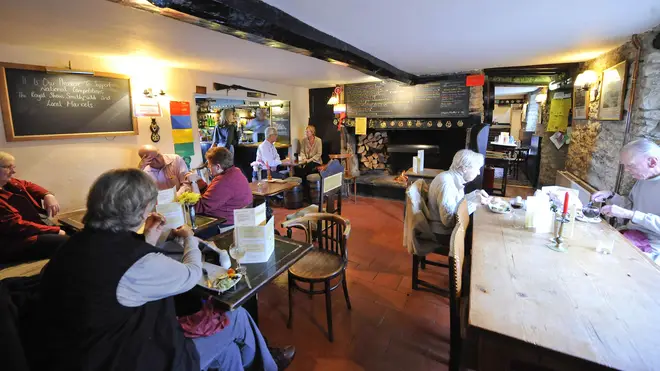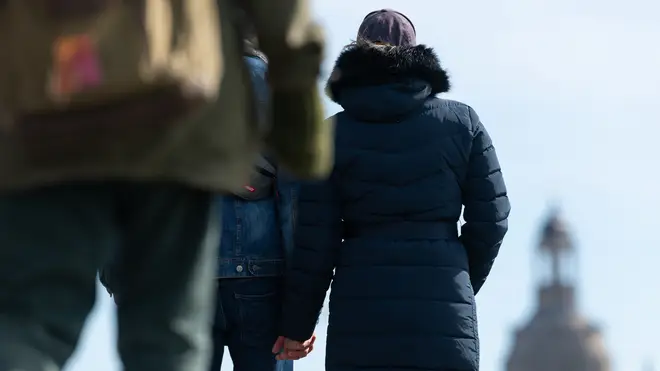
Paul Brand 3pm - 6pm
23 April 2020, 17:36

Social distancing measures may have to stay in place for the rest of the year even after lockdown is lifted, according to chief medical officer Chris Whitty.
LBC News has spoken with a string of experts and other workers who have shared their views on what they think life will be like after lockdown - here's what they had to say:
"I definitely can't see any live events or large conferences happening for the rest of the year," freelance sound technician Zack Piercey, who lost all his contracts due to coronavirus, told LBC News.
For all the latest updates on coronavirus, follow our live blog
He said: "I'm hoping that because I'm more on the corporate side I might get some video conferencing work - but for the most part it's a dead industry while people can't be close.
"Corporate events are based around people networking."

For music festivals and concerts, Mr Piercey said that while he wasn't sure of the industry's future, he felt it "wouldn't feel right" to try and continue with a gig while social distancing.
He said: "Live music is all about the energy, isn't it? I don't know if a crowd standing two metres apart from each other would really work.
READ MORE: Masterchef hopeful cooks for navy veteran neighbour after his online orders kept getting cancelled
"And then there's the queues for the bathroom, merchandise, standing around the bar. The band might not even fit on stage."
He added: "I know live music and conferences will come back, but I'm worried that we're an industry that will be forgotten about after June."
Meanwhile, Emma McClarkin, the chief executive of the British Beer and Pub Association, said reopening bars and pubs while observing social distancing measures would be "extremely difficult" for staff and customers alike.
She warned that trade wouldn't immediately return to pre-coronavirus levels, and could, in fact, be down by up to 50%.
READ MORE: Two pet cats test positive for coronavirus
"It’s clear that the government are going to need to give pubs special consideration for a restart, as well as specific support just for them.

"We need these measures put in place now, to ensure that pubs can survive and be ready to re-open when safe to do so and then help as they slowly recover.
"Trade will not immediately return to the level it was before the COVID-19 crisis hit when pubs reopen.
READ MORE: Boris Johnson ICU nurse said he 'absolutely needed to be there'
"Upon reopening, trade could be down by as much as half what it was before.
"It will inevitably take time for consumer confidence to build. Social distancing restrictions in pubs will inevitably have a direct effect on footfall in pubs."
Many relationships, too, are now reported to be on the rocks, which could lead to a "relationship reckoning," post-lockdown according to Aidan Jones, the chief executive of Relate.
A recent study carried out by the relationship charity found that 12% of couples isolating together are having doubts about their partner, which increases to 21% for those aged between 25 to 34.
READ MORE: Up to 300,000 Britons to take part in government research
Money worries were found to be a particular sticking point in those relationship woes.
"We always see a peak in people seeking relationship support after Christmas, when spending unusually long together brings issues to the surface," Mr Jones said.
He added: "Add to that the current extended period of isolation, worries about job security, finances, how to juggle work with childcare and uncertainty about the future - and it's clear why we're expecting a post-lockdown relationship reckoning."

So - if there are going to be changes to society, what about the changes to our personal habits?
"I think there will be quite a bit of fear after being told to keep a two-metre distance," Anna Whittaker, a professor of behavioural medicine at Sterling University, told LBC News.
She added: "I guess one of the things we're hoping will happen is that people will develop more habits in terms of being more active."
READ MORE: Nurse 'quite overwhelmed' after being told his new patient was the PM
Ms Whittaker went on to say there was a lot of uncertainty about how things could change - and pointed towards drinking habits as an example.
"People could be drinking less - but I don't know if that's true either. You save a lot of money drinking at home," she said, adding that it would be good to compare scenarios before and after lockdown.
But, she added: "I don't think it'll be this ideal health outlook with people stopping drinking and stopping smoking that we hope it might be."

James O'Brien reveals how coronavirus will change his day-to-day life
It's not all bad news for our habits, according to Ms Whittaker.
She said the lockdown had brought a "greater appreciation" for communication, meaning lots of people had been getting back in contact with people they maybe hadn't spoken to in a long time.
For elderly people, in particular, Ms Whittaker said she had noticed them "getting much more involved" in technology.
She said: "I think a lot of that will continue. It has enabled them to get to things that they couldn't usually get to as long as they have someone to help set themselves get set up with on Zoom, etc."
READ MORE: Captain Tom Moore receives Pride of Britain award for enormous £28m fundraising effort
Professor Ben Voyer, a behavioural scientist and psychologist, has also been looking at the bigger picture of life after lockdown, telling LBC News it could change Western culture as a whole.
He said: "Cultural changes may also be witnessed in the Western world, where people may realise the value of a collectivist mindset as opposed to an individualist mindset.
"That is, in collectivist cultures, the default is to take care of others because you expect others to take care of you.
"In individualist cultures, everyone is expected to take care of themselves, which can lead to difficulties in times like a pandemic, where we, as a society, are relying on everyone changing their behaviours in order for things to bet better."